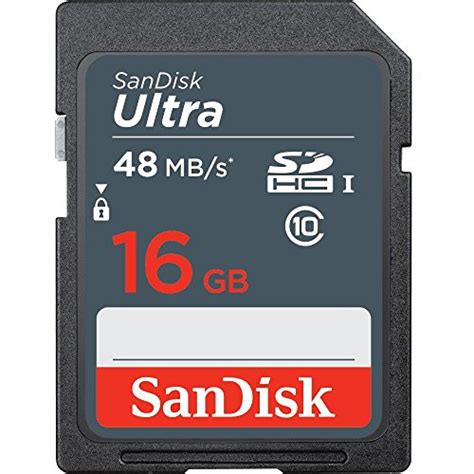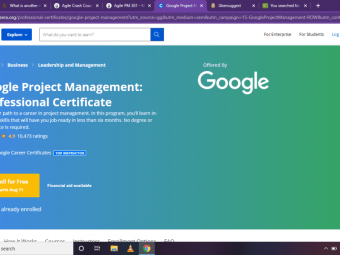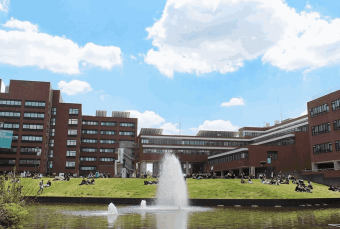
These courses are:
Bachelor's degree
Location:
4 years
Approximate Program Length
120
Total Credits
$398
Cost per Credit
Online
Format
Start when you're ready
Register by: Jul 20, 2022
A cleaner world starts with you. Make a difference in today’s environmental landscape with an online Bachelor of Science in Environmental Science degree. Through courses in science and environmental issues, this program will help you understand renewable resources, sustainable green living, urban infrastructure and the changing climate.
Explore contemporary issues like sustainability, ethics and public policy analysis
Analyze environmental issues using physical and life sciences
Propose solutions to environmental problems
Manage environmental resources sustainably
Expand your critical and scientific thinking, information utilization, analysis and solutioning skills
Course at a time
Weeks per course
Courses per year
Program Details
You’ll need 120 credits — which include 15 credits of a focus study — to complete this Bachelor of Science in Environmental Science degree program. Your course schedule may vary based on transferable credits or credits earned through the University’s Prior Learning Assessment.
Here’s where you’ll pick up the bulk of your program-specific knowledge. By the time you finish these courses, you should have the confidence and skills needed in a professional environment.
These courses lay the foundation for our degree programs, because communication, math and writing skills aren’t just universally applicable in the business world — they’re useful in daily life.
Your focus study includes classes in an area of your choosing outside of your required course of study. Focus study adds to the interdisciplinary nature of your degree by supplementing your core discipline in environmental science.
Elective courses allow you to learn about topics you’re interested in, whether they’re related to your degree or not. That means you’ll have a degree that’s unique to you and your education goals.
Here’s where you’ll pick up the bulk of your program-specific knowledge. By the time you finish these courses, you should have the confidence and skills needed in this field.
Select from a variety of courses that help lay the foundation for your degree program. Because communication, math and writing skills aren’t just universally applicable in the professional world — they’re useful in daily life.
4 Credits
This course provides students with in-depth knowledge of the principles and applications of chemistry. Topics include chemical nomenclature, atomic theory, stoichiometry, periodicity, chemical bonding, thermochemistry, gas laws, and properties of solids and liquids. Students may apply these concepts using practical examples, facilitated discussions, and experiments conducted through completion of virtual labs. This course is the first half of the general chemistry sequence, which is completed in CHM/151: General Chemistry II.
4 Credits
This course continues the examination of principles and applications of chemistry that was begun in CHM/150: General Chemistry I. Topics include properties of solutions, acids and bases, kinetics, equilibrium, thermodynamics, oxidation & reduction, ionic and redox equations, and electrochemistry. Students apply these concepts using practical examples, facilitated discussions, and experiments conducted through completion of virtual labs.
3 Credits
This course will introduce the key concepts of geology by examining the Earth and the processes that take place within it. Topics will include historical geology, rocks and minerals, plate tectonics, igneous activity, mass wasting, weathering, and erosion systems.
3 Credits
3 Credits
This course will introduce students to the scientific principles that are required to identify environmental phenomenon. Students will explore the composition and processes of Earth's lithosphere, atmosphere, hydrosphere, and biosphere to examine environmental impact and mitigation of environmental risk.
3 Credits
This in-depth environmental science course examines how people use science to understand how they relate to the environment. The course explores relationships between people and ecosystems, and the science behind how ecosystems work. It reviews the historical development of the environmental movement, interactions between humans and natural ecosystems, and more specifically, the role of a growing population and associated pressures on natural resources. This course further examines how economics, natural systems, and conservation are interrelated. The many forms of pollution as well as types of energy resources are addressed. This course challenges students to consider the impact of lifestyle choices on environmental sustainability.
3 Credits
This course will examine the concepts and issues related to the conservation of biodiversity. Topics will include the impact of society on plants and animals, aquatic and terrestrial ecosystems, extinction, and genetic diversity.
3 Credits
This course provides the fundamental principles of ecology and evolution. Students will focus on populations and communities, adaptation, and other factors that affect organisms.
3 Credits
Students will be presented with a broad treatment of the preservation and efficient use of resources as well as methods of reversing current resource consumption. Topics will include sustainable practices, population growth, hydrologic cycle, water treatment processes, waste management, alternative energies, and sustainable design.
3 Credits
This course applies the theoretical economics tools to environmental issues. Special emphasis will be devoted to analyzing the role of public policy regarding the economy and the environment.
3 Credits
The purpose of this course is to provide the fundamental knowledge of the effects of environmental chemicals on living systems, and the toxic responses of the human and plant systems. Students will discuss risk, ethics, and social responsibility with regard to environmental toxicology.
3 Credits
This course provides an overview of the basic concepts of human and ecological risk assessment. Students evaluate various components of risk assessment, including human health, environmental, occupational, ecological, and risk management. Significant case studies are used to illustrate the assessment process.
3 Credits
This course will introduce topics covering a wide variety of alternative energy sources, the need for renewable energy, as well as the problems associated with them. Energy sources will include oil, coal, natural gas, hydroelectric, nuclear, wind, solar, geothermal, tidal, and biofuels.
3 Credits
This course applies scientific, philosophical, economic, and ethical principles to current and future environmental issues. Students will analyze the cumulative impact of human activities on global ecosystems, as well as responsibilities to the natural world, in terms of the complex interrelationships humans have with their environment.
3 Credits
This course explores the administrative regulations and policies that are requisite to environmental protection. Federal, state, and local policies will be examined.
3 Credits
This course will examine the impact of human activity on the environment. Students will examine a variety of environmental issues influenced by human activity, including the development and impact of global climate change on Earth.
3 Credits
This course examines environmental problems from a local, national, and international perspective. Federal legislation will be reviewed on air pollution and water quality. Students will be introduced to control techniques for treating air and water, and the emerging environmental issues such as global climate changes, bioterrorism, organic pollutants, and industrial ecology.
3 Credits
This course will examine the fundamentals of public policy analysis to the environment. Students will explore the management of public policy issues related to land use and urbanization, ecosystem preservation, global analysis, and policy making.
3 Credits
This course transitions students through the foundations of study at University of Phoenix. Students develop personal strategies for achieving educational goals and develop skills in critical thinking, collaboration, and communication.
3 Credits
The course introduces theories and concepts in psychology that will foster academic success and provide students with opportunities to synthesize and apply that knowledge.
3 Credits
This course develops the reading, writing, and critical thinking skills that are essential for academic and life success.
3 Credits
Students learn how to think critically, focusing on developing the necessary tools and skills to analyze problems, make decisions, and formulate well-supported points of view on key academic, social, and professional issues.
3 Credits
This course introduces students to thinking about and working with numbers by examining the day-to-day and societal importance of money.
3 Credits
This course extends practice in critical reading, writing, and thinking. Emphasis is given to developing an effective writing process that takes into account audience and rhetorical purpose.
3 Credits
This course provides an overview of the key components of comprehensive wellness. Based on a preventive model, the course will allow learners to explore choices that promote wellness with goals of living longer and better.
3 Credits
This course examines the linkages between the evolution of earth and water masses. Students will focus on the physical, chemical, biological and geological aspects of the ocean processes.
3 Credits
This course introduces algebraic concepts providing a solid foundation for college algebra. Topics range from properties of real numbers, the order of operations, and algebraic expressions to solving equations and inequalities. Additional topics include polynomials, factoring methods, rational and radical expressions as well as graphing and functions.
3 Credits
This course presents traditional concepts in college algebra. Topics include linear, polynomial, rational, radical, exponential and logarithmic functions, systems of equations, sequences, and series.
3 Credits
This course examines traditions and developments in the visual and performing arts genres including music, dance, theater, cinema, visual arts, and architecture. Students will be introduced to the elements of each genre, along with an overview of its historical development in Western European tradition.
3 Credits
This course will provide students with the basic concepts of oral presentations. Students will be able to develop and deliver effective individual and group presentations in classroom and professional settings. The course is also designed to provide a maximum opportunity for practice and evaluation of presentation techniques.
1 Credits
This one-credit course introduces students to a survey of the history of mathematics, including the background of famous mathematicians from ancient to modern times and their specific contributions to mathematics. The format and content of the course is conceptual rather than technical.
3 Credits
Students collect, analyze, and interpret data as they examine the role of statistical analysis and statistical terminology. Students also apply appropriate statistical techniques and analytical reasoning in real-world problems to communicate logical arguments and models. The course topics includes probability, statistics, and quantitative reasoning.
3 Credits
This course provides students with an introduction to the organization, administration, and functions of American state and local governments. The relationship between state and federal governments is also analyzed.
3 Credits
This course is designed to introduce physics at an entry level by examining the principal laws of physics leading to a conceptual understanding of how these principles relate to everyday life. The topics in this course include Newton's laws, properties of matter, heat and thermodynamics. Students will apply these principles using practical examples, facilitated discussions, and experiments.
3 Credits
This course will examine the basic principles of chemistry conceptually and specifically. The course will apply chemical concepts to address relevant issues ranging from atomic structure and chemical reactions to organic and biological chemistry. The course topics include matter and energy, chemical bonding, intermolecular forces, chemical equilibrium, and nuclear, organic, and biological chemistry. Students will apply these concepts using practical examples, facilitated discussions, and experiments conducted through a virtual laboratory.
3 Credits
This course introduces accounting students to the use of accounting systems using QuickBooks. Topics include QuickBooks basics, setting up a company, and the management of financial information.
3 Credits
This course is an introduction to financial accounting with an emphasis on using financial data for decision making. The focus will be on the application of basic accounting concepts and principles in enterprise and small business transactions. Students will learn how to identify, measure and report economic events of an enterprise.
3 Credits
This course takes an in-depth look at the key areas of the balance sheet mostly reviewed by management for decision making. Students will apply analytical methods used by management to assess the financial statements, and discuss management challenges and possible solutions for improvements. Areas of focus include receivables, plant assets, bonds, stocks, dividends and the statement of cash flows.
3 Credits
This course is the first in a two-part series that deals with auditing a company's financial reports, internal controls, and Electronic Data Processing (EDP) systems. Topics include auditing standards, evidence, audit planning and documentation, materiality and risk, internal control, statistical tools, and the overall audit plan and program.
3 Credits
This course is the second in a two-part series that deals with auditing a company's financial reports, internal controls, and Electronic Data Processing (EDP) systems. Topics include the personnel and payroll system, inventory, capital acquisition cycle, selected balance sheet and income statement accounts, audit reports, assurances and other services, professional ethics, and legal responsibilities.
When you earn your BS in Environmental Science, you’ll be equipped with a concrete set of skills you can apply on the job.
Topics covered in this degree include:
Your academic counselor will help you schedule classes for our online Bachelor of Science in Environmental Science program.
A BS/EVS degree can help prepare you to be an:
According to the Bureau of Labor Statistics, job growth for environmental scientists and specialists is projected to be as fast as average between 2020 and 2030.
BLS projections are not specific to University of Phoenix students or graduates.
Get career coaching, resumé building and interview prep, for life. While outside career advising can cost over $200 an hour, at University of Phoenix it’s built right into your degree at no added cost.
You don’t have to go it alone.
You’ll have a team of advisors invested in your success from day one — dedicated to helping you build your confidence and a personalized career plan you can stick with.
Tools and resources available 24/7/365
We're a university built for the busy. Build your resumé, prepare for an interview and plan your career — whenever it fits your life, day or night.
Networking & mentorship
Through virtual job fairs and networking with the alumni community, we've made it easy to tap into the experience and connections of your peers and colleagues at the University.
Affordable, Fixed Tuition
$398
Cost per credit
While education costs have risen an average of 2.6% in the U.S. every year, our Tuition Guarantee ensures you’ll pay one flat rate from the moment you enroll to the day you graduate.
On average, students with prior eligible college credits and relevant life experience saved $11k and 1 year on their undergraduate degree.
We’ve expanded our $1M scholarship commitment
Our scholarships aren’t just for the chosen few. We’ll help you understand which scholarships you may qualify for, worth up to $3,000.
Credit transfer made easy
Earn your degree faster, and for less, with eligible transfer credits.
Get credit for what you already know
Have previous relevant work and life experience evaluated for potential credit.
Our enrollment representatives provide personal support while you make an informed choice about going back to school. Reach us by phone at 844-937-8679 or chat with us 7 days a week
Balancing family, work and school
Work toward your degree without giving up what matters most. Start your degree year-round and take one class at a time.
Online learning
Enroll in online classes and attend class whenever it fits your life, day or night.
Around-the-clock support and resources
You have a support team available up to 20 hours a day, 5 days a week. And our academic counselors, who are with you every step of the way, have earned a 5-star rating from 90% of our surveyed students.
University of Phoenix is accredited by the Higher Learning Commission (HLC), hlcommission.org. Since 1978, University of Phoenix has been continually accredited by the Higher Learning Commission.
Doris Savron
Vice Provost of Colleges, University of Phoenix
Environmental science looks at the relationship between scientific principles and the environment. It explores how social, political and cultural processes impact our planet by observing the physical, chemical and biological impact on the Earth.
Environmental science degrees can prepare you for careers in environmental compliance, environmental regulation and research science. Positions in these fields require an understanding of the social and political impacts on the environment.
Environmental science uses concepts from biology, earth science, physics, chemistry and social science to understand the environment and the things that impact it.
Yes, you can earn your Bachelor of Science in Environmental Science 100% online with access to online resources 24/7/365.
Our online Bachelor of Science in Environmental Science degree is designed specifically so that working professionals like you can earn it without leaving your current role. The degree helps you build a strong foundation in environmental science while teaching the skills to help prepare you for a career in the field. You’ll learn from faculty who are currently working in the field and you’ll be able to join our large alumni network. Additionally, Career Services for Life™ help students in their current position and prepare them for career enhancement and professional opportunities until retirement.
*While widely available, not all programs are available to residents of all states. Please check with a University Enrollment Representative.
Bureau of Labor Statistics (BLS) projections are not specific to University of Phoenix students or graduates.
 Classic Accessories Veranda Water Resistant 11 Foot Patio Umbrella Cover
Classic Accessories Veranda Water Resistant 11 Foot Patio Umbrella Cover
 Sandisk 16 Gb Class 10 Sd Hc Ultra Flash Memory Card 10 Pack Bundle With
Sandisk 16 Gb Class 10 Sd Hc Ultra Flash Memory Card 10 Pack Bundle With
 Fairwin Braided Leather Dog Training Leash 6 Foot 56 Foot Military Grade H
Fairwin Braided Leather Dog Training Leash 6 Foot 56 Foot Military Grade H
 3m Reflective Dog Leash 5ft Long With Traffic Padded Handle Dog Training Leas
3m Reflective Dog Leash 5ft Long With Traffic Padded Handle Dog Training Leas
 How To Be Your Dogs Best Friend The Classic Training Manual For Dog Owners
How To Be Your Dogs Best Friend The Classic Training Manual For Dog Owners
 Classical Naptime For Tots
Classical Naptime For Tots
 Doggie Stylz Set Of 2 Reflective Therapy Dog In Training Removable Patches Wit
Doggie Stylz Set Of 2 Reflective Therapy Dog In Training Removable Patches Wit
 6 Pcs Service Dog In Trainingworkingstress Amp Anxiety Response Embroidere
6 Pcs Service Dog In Trainingworkingstress Amp Anxiety Response Embroidere
 Service Dog In Training Patch With Hook Back And Reflective Lettering For Servic
Service Dog In Training Patch With Hook Back And Reflective Lettering For Servic
 Four Paws Wee Wee Pee Pads For Dogs And Puppies Training L Gigantic Xl St
Four Paws Wee Wee Pee Pads For Dogs And Puppies Training L Gigantic Xl St
 Pny 128gb Elite X Class 10 U3 V30 Microsdxc Flash Memory Card 100mbs
Pny 128gb Elite X Class 10 U3 V30 Microsdxc Flash Memory Card 100mbs
 Academy Of Beasts V Shifter Romance
Academy Of Beasts V Shifter Romance











![DevOps Engineer Salary in the US in 2021 [For Fresher’s & Experienced] DevOps Engineer Salary in the US in 2021 [For Fresher’s & Experienced]](https://www.courses-for-you.com/images/uploads/thumbs/11-38.jpeg)


